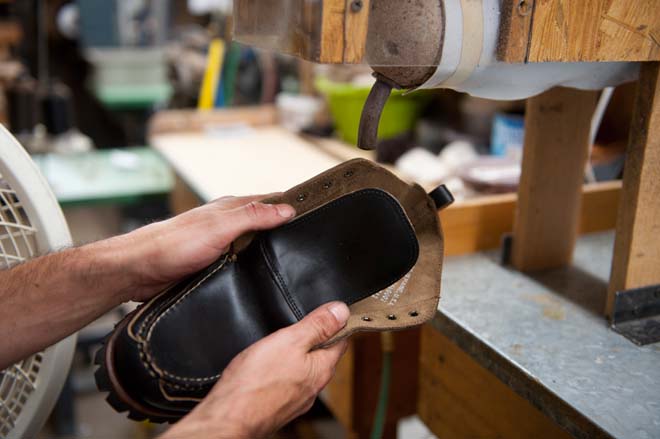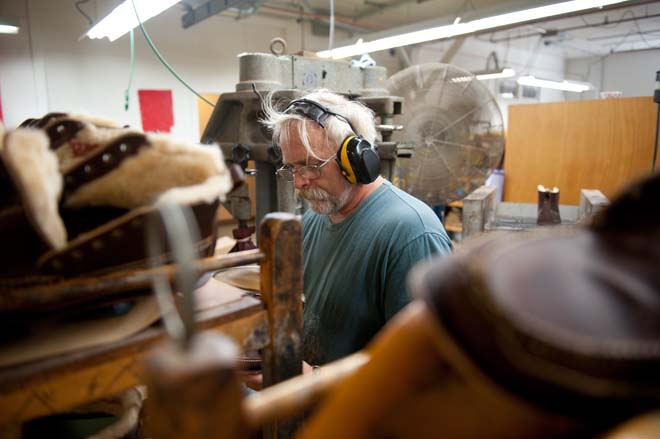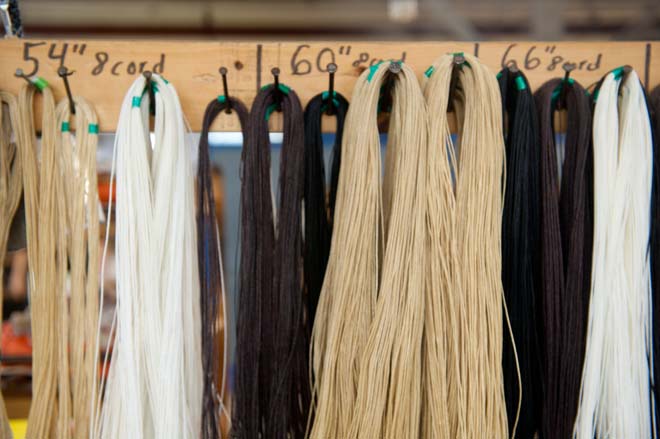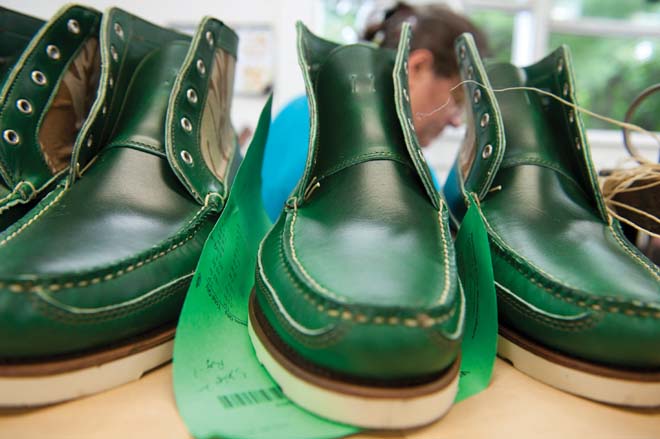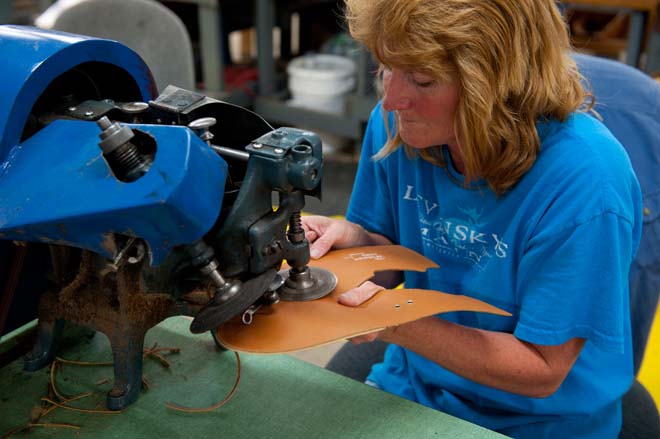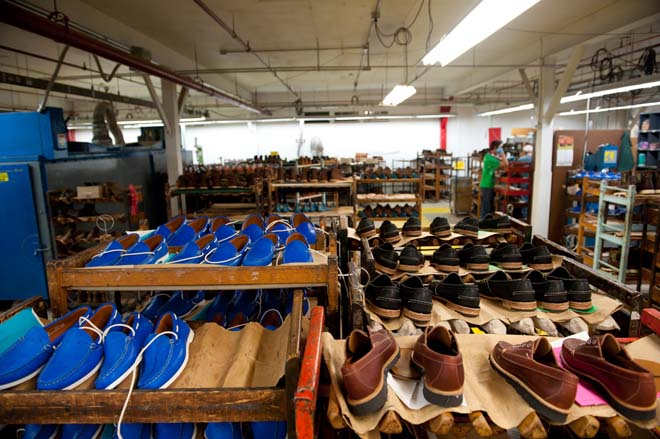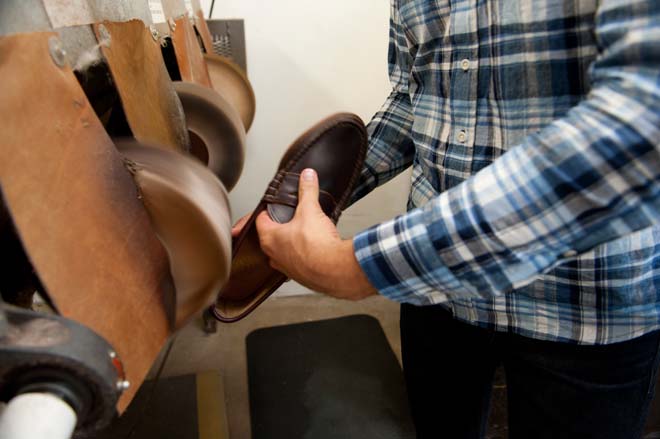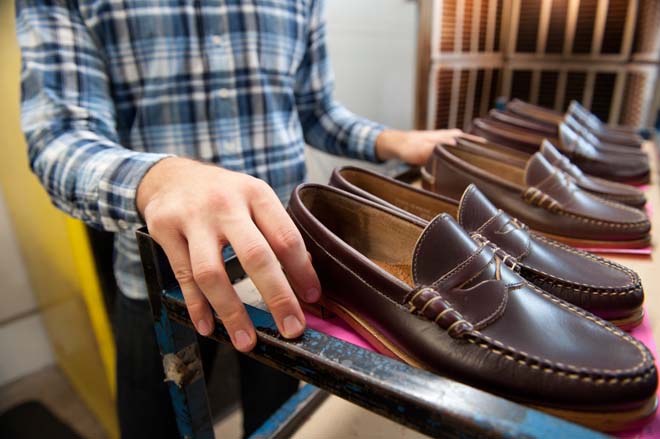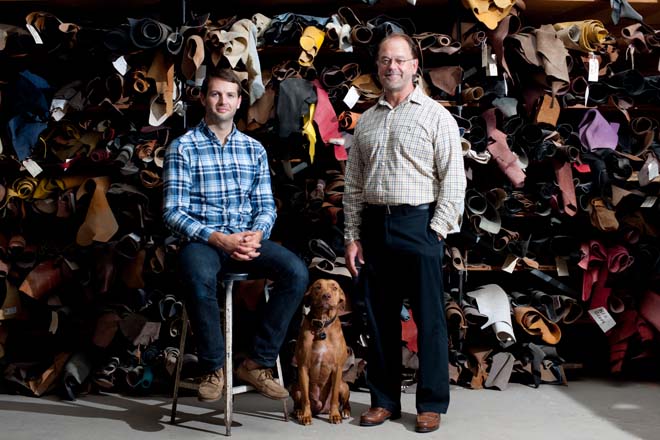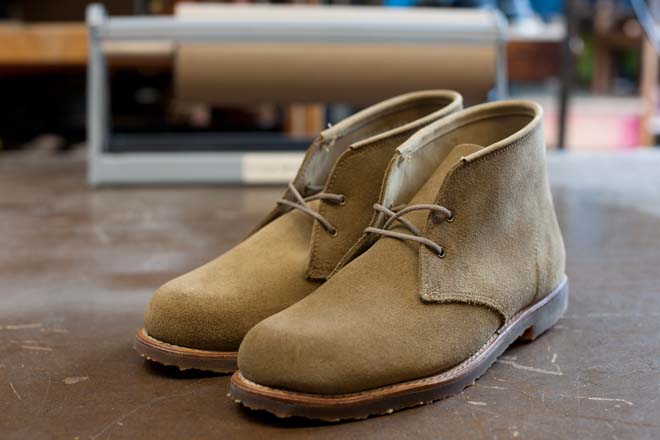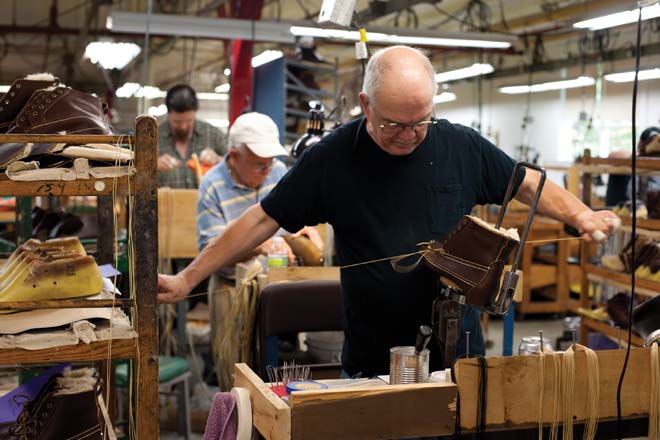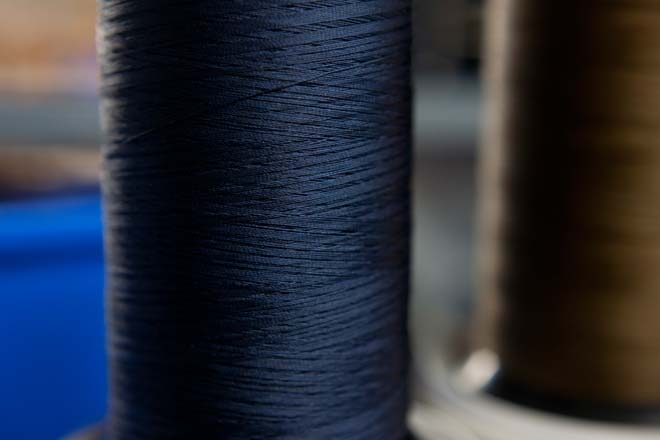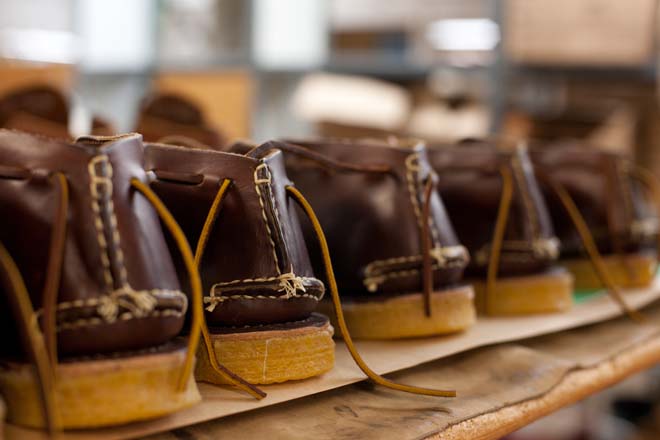A Dream of Shoes
PROFILE-November 2012
By Sarah Braunstein
Photographs by Nicole Wolf
A look into Lewiston’s Rancourt and Co.’s shoes and the father and son team behind them.
You know that common nightmare scenario in which something you want so badly is just out of your reach? Sealed behind glass or hidden behind a locked door? It may be a person. It may be a stack of money or jewelry or the teddy bear you lost in the third grade. Or it may be a pair of shoes.
This is the sensation I experience when I walk into Rancourt and Co.’s shoe factory in Lewiston. I’m here on business, and I’m supposed to be in objective journalist mode. But my eyes land on dreamy shoes. I blink. Gorgeous, supple leather. Practical, tough, classic, hand-sewn. The Grey Mohave Suede Blake Boot sends chills up my spine. The Mushroom Suede 5-Eyelet Mid Boot looks good enough to eat.
But wait. These are for men. They’re also—a bigger concern, let’s be honest—out of my price range. So, like Tantalus, like a person in a dream unable to possess the cherished things before her, I wander the factory, touching boots with my fingertips, marveling at the racks of shoes in various stages of completion, at the tools strewn across work stations, the spools of thread, tins of wax, collections of needles. Why do these objects dazzle me so?
Let me be clear: I am no Imelda Marcos. I own a variety of shoes, and I have a pretty respectable collection of vintage boots, but everything fits in one closet. And yet this factory—with its warm, heady smell of leather and dye, its samples of stylish but classic boots and moccasins, its endless piles of suede, its cases of gleaming loafers—gets my heart thrumming. But I have to tell myself no. I can’t afford them. I just can’t. Right?
After spending an afternoon with Mike and Kyle Rancourt, I come to question our culture’s obsession with cheapness. I start to wonder why I’ve filled my closet with knock-offs that last one or two seasons. Because Rancourt and Co. shoes—and the father-and-son team behind them—make you rethink the concept of value. They make you reconsider notions of beauty, practicality, comfort, and sustainability. This family business has a mission: to join old methods of shoemaking with new methods of shoe selling. They’re merging traditional craftsmanship with cutting-edge business strategies. And they’re putting Maine-made shoes on the ground all around the world.
The father is Mike Rancourt: 58 years old, bespectacled, quick-witted, calm, and centered. He could play Ben Franklin in a movie—he has that wise, twinkling quality about him. He’s been doing this all his life, learned the trade from his own father, Dave, a hand-stitcher who cut his teeth at Marchand Moccasin. In 1964, Dave started his own factory, which did contract work for Quoddy Moccasin. In 1982, Dave and Mike founded Down East Casual Footwear, a company that was eventually purchased by Cole Haan. In 1992, along with his wife, Debbie, Mike started Maine Shoe Co., which was later bought by Allen Edmonds. For Mike, the cycle of smaller companies being absorbed by larger ones is a way of life. And while he accepts the ebb and flow of acquisition and merger, and despite the fact that his family benefitted from the sales, he didn’t want to keep growing companies only to sell them.
After selling Maine Shoe Co., Mike worked for Allen Edmonds for 13 years. But when in 2009 they decided to close the Lewiston plant, he took stock. “I had no interest in traveling around the world doing offshore work. I started talking to Kyle: I said, ‘One way or another I’m going to start my own company. You want to join me?'” Enter Mike’s son, Kyle Rancourt, 28, vice president of sales and marketing. A 2009 graduate of Marquette University, Kyle is lanky and down-to-earth, with the wholesome good looks of a kid on the cover of a college brochure. Think Ashton Kutcher without the punking.
They got to work. In three years, they’ve made 100,000 pairs of shoes and sold them in dozens of countries. They started with 22 employees; today, they have 62 on the payroll. Mike says the big challenge wasn’t getting a factory off the ground—after all, he’d done that before. Their challenge was sustaining a local business. Could his new company help restore Lewiston’s shoe industry? And keep it there?
So in addition to making its own line, Rancourt and Co. does major contract work for some huge players in the shoe industry, including Ralph Lauren, Red Wing, and Timberland, which means that Rancourt produces handmade shoes for the big guys, though the Rancourt name isn’t on them. Mike explains that, typically, contract work starts to control the business: “The biggest company eventually puts pressure on you—join us or leave.” That happened before, and Mike wanted to protect his new business from such a fate.
So Mike asked himself: “How do you sustain a business that continues to grow financially, so you can provide all the benefits you want to provide to your workforce, without selling to a bigger company? Local business is incredibly important. It’s how a community survives. As soon as you become part of globalization, they can move you and resources anywhere in the world for less money.” He turned to Kyle to help him figure out a strategy. Kyle, who had studied marketing, public relations, and communications, had some bold ideas: they could do manufacturing and retail, but without a store in every major city. In other words, e-commerce, but with exceptional customer service and unheard-of product quality. Mike says, grinning: “I finally understood how to grow this business.”
In addition to their contract work, the Rancourts and their team are developing innovative ways to market and sell their own brand. They’ve entered the wholesale business—Rancourt and Co. shoes are now sold at Brooks Brothers, Club Monaco, Jack Spade, and other high-end retailers.
But they’re doing something else, something rare in the handcrafted shoe industry: customizable direct-to-consumer selling. They’re currently developing a website tool—to be launched in December—that lets the customer design a pair of shoes online. They’re also pioneering a try-at-home program. The level of customization provided by the company is, simply put, unparalleled. While a few big companies offer some degree of customization—Allen Edmonds and Nike, for example—the customer’s choices are pretty limited. When you order a pair of shoes from Rancourt, you can customize everything: style, leathers, sole, thread color, laces, eyelets. And a customer-service rep—Taryn, Kyle’s winsome girlfriend—is on the phone to help with the design. In two to three weeks, the perfect pair of shoes, boots, or moccasins arrives at your doorstep.
Mike and Kyle are also excited about a recent partnership with David Wood Clothiers in downtown Portland. At two David Wood shops—David Wood and Portland Dry Goods—you can view samples, examine materials, and put in your own customized order. Employees have been trained by Kyle to fit customers, which means fewer sizing errors.
It’s a new way of thinking about an old product. Mike and Kyle have a foot in two worlds, so to speak: they can sell their own brand directly and by wholesale, and they can take on the contract work that helps sustain them—and that lets big companies retain a Maine presence when they might otherwise make everything overseas.
After my tour of the factory concludes, I step out into the parking lot and look down at my cork-soled sandals, already wearing thin after only a few months. I peek under the ankle strap: Made in China.
I think about a book I love, The Unbearable Lightness of Being by Milan Kundera. (Change of gears, but stay with me here.) In the novel, Kundera describes two types of men: those who spend their lives loving woman after woman in a quest for variety, and men who spend their lives searching through variations for the single woman who embodies what he wants as he imagines it. The one match.
After spending time at Rancourt and Co., I wonder if the same idea might apply to a pair of shoes. You can collect an assortment of good-enough shoes. You can enjoy the variety. There’s absolutely nothing wrong with this. But in my shoe-dream world, I’m always searching for the platonic ideal, the shoe that embodies all that I want as I imagine it. Comfort, aesthetic beauty, endurance. Kyle tells me the company is in the process of launching a women’s line, so I may soon find my match.
When you find the perfect pair, do you stop looking? Imagine splurging on the one handmade, customized pair with quality so exceptional that the shoes last for decades. Sending them back to Lewiston for a 50-buck repair every couple of years is a deal. You invest. You make them yours. They become an extension of you. They project the image of who you truly are, and they comfort you wherever you go. The great search ends. They fit.





